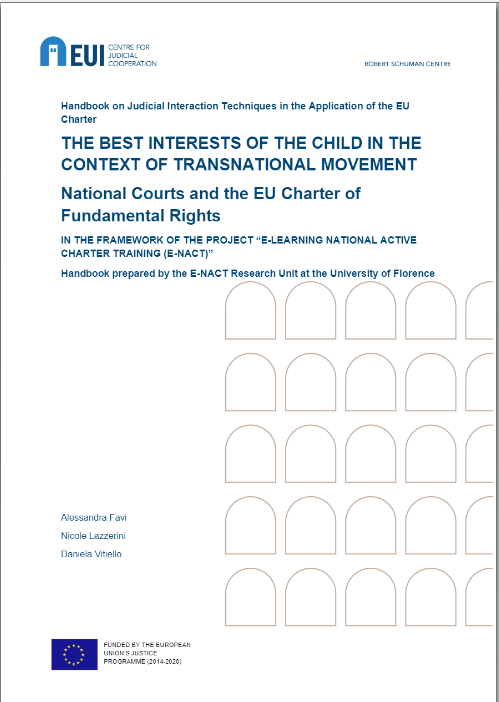
Resumen:Este Manual es el resultado de una investigación realizada en la Universidad de Florencia en el marco del proyecto "e-Learning National Active Charter Training (e-NACT)" cofinanciado por la Comisión Europea (DG Justicia, JUST-AG-2016-04) y coordinado por el Instituto Universitario Europeo. La investigación tiene como objetivo liberar el potencial de la Carta de los Derechos Fundamentales de la UE (EUCFR) en la jurisprudencia nacional sobre protección de la infancia. En términos de alcance, la investigación se centra en dos (macro) conjuntos de situaciones en las que la relevancia del derecho de la UE se activa por la circunstancia de que los niños o sus padres están (o han estado) en movimiento. Se presta especial atención a la contribución del Derecho de la UE en los casos relativos a la reagrupación familiar o a la unidad familiar, y en el contexto del Derecho de migración y asilo. En cuanto a la metodología, la investigación se desarrolla en tres fases principales. Comienza con una evaluación preliminar de las disposiciones del RGCUE potencialmente relevantes en los casos relacionados con los niños.
Summary:This Handbook is the outcome of research conducted at the University of Florence within the framework of the ‘e-Learning National Active Charter Training (e-NACT)’ project co-funded by the European Commission (DG Justice, JUST-AG-2016-04) and coordinated by the European University Institute. The research aims to unleash the potential of the EU Charter of Fundamental Rights (EUCFR) in domestic case law on child protection. In terms of scope, the research zooms in on two (macro-)sets of situations in which the relevance of EU law is triggered by the circumstance that children or their parents are (or have been) on the move. Attention is paid in particular to the contribution of EU law in cases concerning family reunification or family unity, and in the context of migration and asylum law. Concerning the methodology, the research unfolds through three main phases. It begins with a preliminary assessment of the provisions in the EUCFR potentially relevant in child-related cases.
Fecha publicación: 07-02-2022
Autor: European University Institute; Favi, Alessandra ; Lazzerini, Nicole ; Vitiello, Daniela
ISBN / ISSN: 978-92-9466-126-5 /-
Link: https://bit.ly/3tza3Rv
Palabras clave: aplicación de la ley , jurisprudencia (UE) , protección de la infancia , derechos del niño , Tribunal de Justicia de la Unión Europea , enseñanza a distancia , Carta de los Derechos Fundamentales de la UE , derecho de la UE , reagrupación familiar , libre circulación de personas , cooperación judicial , derecho nacional , derecho de asilo , guía del usuario , formación profesional
Keywords: application of the law , case law (EU) , child protection , children's rights , Court of Justice of the European Union , distance learning , EU Charter of Fundamental Rights , EU law , family reunification , free movement of persons , judicial cooperation , national law , right of asylum , user guide , vocational training
- Saltar a la navegación principal
- Saltar al contenido principal
- Saltar a la barra lateral principal
- Saltar al pie de página

CDE Almería - Centro de Documentación Europea - Universidad de Almería
Centro de Documentación Europea de la Universidad de Almería